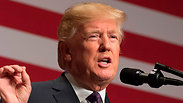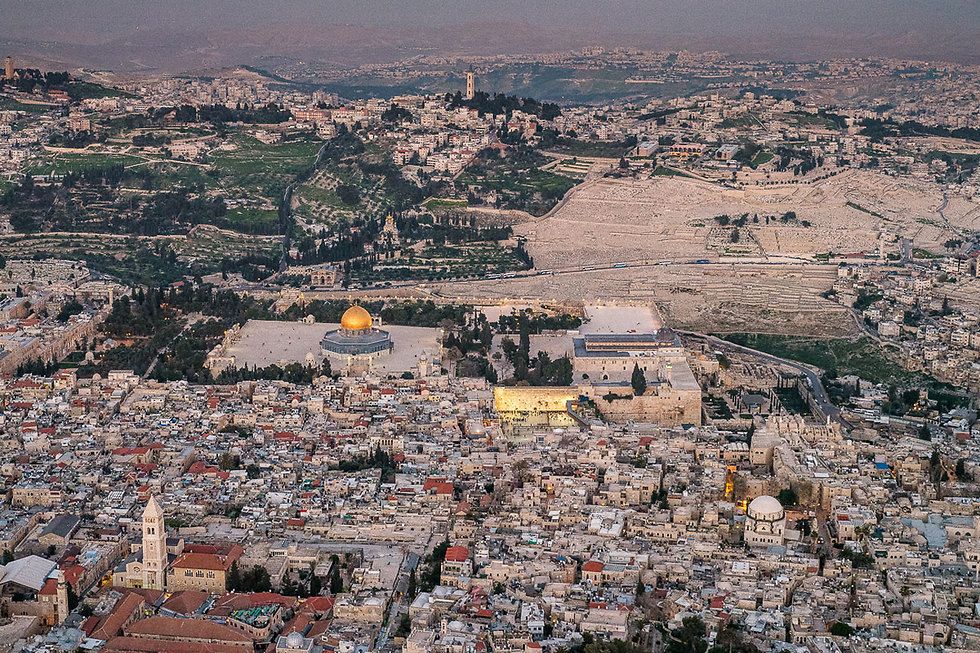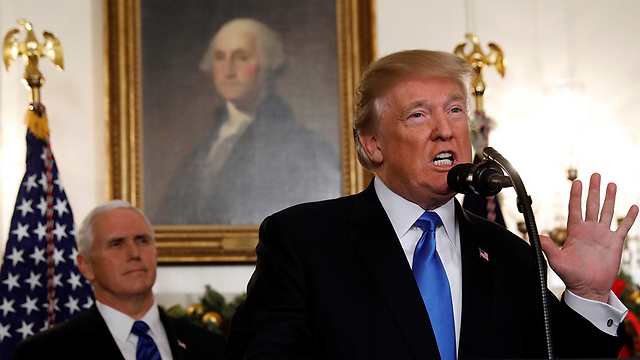
The problem with Trump’s Jerusalem announcement
Op-ed: The US president was right to declare that Israel’s borders in Jerusalem would be determined in future negotiations with the Palestinians; but by failing to address the other side of the border, he encouraged the opponents of an agreement on both sides and reduced the chance for a serious peace process anytime soon.
The announcement is indeed a joyous occasion, despite being trivial and lacking any practical meaning. That being the case, why is it problematic?
The problem is primarily with what wasn’t included in the statement. The main issue is not Jerusalem’s status as Israel’s capital, but which Jerusalem the president is talking about.
The term “united Jerusalem under Israeli sovereignty” doesn’t refer to neighborhoods like Kiryat HaYovel or French Hill, which are in west Jerusalem, or heritage sites like the Western Wall or the Old City’s Jewish Quarter, which will be part of Israeli Jerusalem in every future permanent agreement.
The term “united Jerusalem” refers to the unification of west Jerusalem with east Jerusalem, which was annexed to Jerusalem in 1967 after the Six Day War. This area included 28 Palestinian villages, which were neither part of the city nor part of what the Palestinians call Al-Quds, and it is populated today by some 300,000 Palestinians who make up about 40 percent of the city’s residents.
These areas, which are clearly Palestinian and are being run as Palestinian but are called “Jerusalem” although the Jerusalem Municipality and Israeli state authorities avoid setting foot in them, are in fact a Jerusalem issue that has yet to be decided.
Trump was right to declare that Israel’s borders in Jerusalem would be determined in future negotiations with the Palestinians, but he avoided saying what would happen on the other side of the border. Had he noted that the area that won’t be left in Israel’s hands would become the capital of the future state of Palestine, he would have increased the chance of reaching a peace agreement. By making a unilateral statement, he encouraged the opponents of an agreement on both sides, reducing the chance for a serious peace process anytime soon.
Recognizing Jerusalem as Israel’s capital is possible not only by the US, but by the entire world, including the Palestinians. Even the Palestinian Liberation Organization’s official stance is that, in a permanent agreement, west Jerusalem will be Israel’s capital alongside east Jerusalem as Palestine’s capital.
Two capitals for two people
The Geneva Initiative model, which is accepted by senior officials on both sides, presents a possible picture of Jerusalem with two recognized capitals of two states: West Jerusalem, the Jewish neighborhoods of east Jerusalem and the Old City’s Jewish Quarter, including the Western Wall—under Israeli sovereignty; the Arab neighborhoods of east Jerusalem, the rest of the Old City quarters and the mosque area on the Temple Mount—under Palestinian sovereignty; and free access to everyone in the entire Old City and special arrangements in the holy sites.

Menachem Begin also said: “We have learned from history that war is avoidable, peace is unavoidable. Many nations have waged war among themselves, and sometimes they used the tragic term ‘perennial enemy.’ There are no perennial enemies. And after all the wars, the inevitable comes—peace.”
After the obvious has been said, and the US has recognized Jerusalem as Israel’s capital and voiced its commitment for peace in the region, it’s time for brave moves and for a fulfilment of the promises on peace. It’s time to agree on the borders of Israeli Jerusalem and on the borders of the State of Israel, alongside a Palestinian state. The two-state solution will strengthen Jerusalem’s status as Israel’s legitimate capital and maintain its Jewish and democratic character. This is a most important Zionist interest.
Brigadier-General (res.) Giora Inbar served as commander of the IDF's Lebanon Division, the Givati Brigade and the elite Shaldag Unit.











